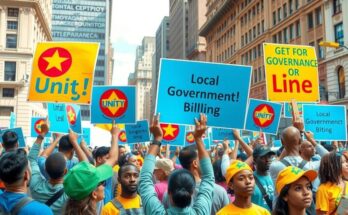Advocacy organizations have initiated a lawsuit against President Trump’s administration aimed at preventing the early termination of Temporary Protected Status (TPS) for Haitians. The lawsuit follows Trump’s efforts to revoke TPS extensions previously granted under President Biden, raising questions about legal authority and the mental health consequences for affected immigrants. The community expresses anxiety regarding potential deportation and the future instability in Haiti.
On March 3, 2025, three advocacy organizations—Haitian-Americans United Inc., the Venezuelan Association of Massachusetts, and the UndocuBlack Network—filed a lawsuit against the Trump administration that seeks to prevent the early termination of Temporary Protected Status (TPS) for Haitians living in the United States. This legal action arises from President Trump’s administration’s attempt to rollback the TPS extension facilitated by former President Biden, which allowed Haitians to remain in the U.S. until February 2026.
The lawsuit contends that the Trump administration oversteps its authority in attempting to revoke an already granted extension of TPS. Mirian Albert, a senior attorney for Lawyers for Civil Rights representing the advocacy groups, emphasized that TPS is vital for immigrants fleeing violence, political instability, and natural disasters. “TPS is a critical lifeline for immigrants who have fled extreme violence, political upheaval, and natural disasters in their home countries,” Albert stated.
This suit is anticipated to be the first among several similar legal challenges, as many immigrants living in the U.S., including those who supported Trump in the 2024 presidential election, express their opposition to his moves against TPS. Paul Simon, a pro-Trump Haitian immigrant residing in Boston, stated, “He can’t preemptively end something that has been granted to them,” voicing skepticism about the feasibility of Trump’s actions.
Approximately 30,000 Haitian immigrants have found refuge in Massachusetts due to ongoing violence and political turmoil in Haiti. Advocacy groups stress that the removal of TPS will have profound impacts not only on the economy but also on the mental health of these individuals. Psychologist Dr. Carlot Celestin noted alarming instances of depression among Haitian immigrants, highlighting cases of extreme distress regarding the possibility of deportation.
Community members like Domingueson Anglade voiced their fears about the potential loss of TPS, stating, “When I think about this possibility of losing the TPS, I immediately plunge into a depression.” Dieufort J. Fleurissaint, executive director of Haitian-Americans United Inc., reflected these sentiments by explaining the community’s anxiety concerning the potential loss of legal status, deportation risks, and challenges in finding alternative legal pathways in the U.S.
Throughout his term and the subsequent campaign cycle, President Trump has made controversial remarks regarding Haitian immigrants. The lawsuit cites instances where Trump allegedly referred to Haiti and African nations as “s—hole countries.” Additionally, rumors propagated by Trump’s political allies during his 2024 campaign further fueled concerns within the immigrant communities.
In conclusion, the lawsuit filed against the Trump administration reflects deep-seated concerns regarding the proposed termination of Temporary Protected Status for Haitians in the U.S. The advocacy groups argue such actions violate legal precedents and threaten the well-being of thousands of immigrants. The ongoing mental health consequences and fears of deportation underline the urgency and gravity of this situation, emphasizing the critical role TPS plays in the lives of many vulnerable individuals.
Original Source: www.blackenterprise.com




